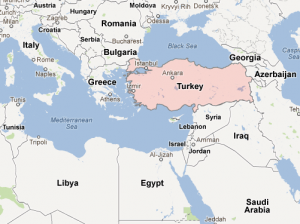ICT Market: Time for Partnership with Turkey
The utilization and importance of Information and Communication Technologies (ICT) during the Arab Spring and Turkey’s strategic proximity to the region’s countries has put Turkey in the spotlight.
The deployment of ICT in the democracy arena had a major impact during the Arab Spring. Just like any transformation, it brought its own challenges, of course. Those that were technologically inclined, especially the younger generation, embraced the availability of new technology, such as social media, to motivate and give voice to their ideas. While there is a great deal of respect and admiration for Western trade and their diplomatic allies, there is a determination across the Middle East and Arab Spring countries to define their own agenda when it comes to overseas business and international relations. Turkey is well placed both politically and geographically to support trade between established and emerging markets.
Turkey has been the bridge to west and east and the Post Arab Spring incidents intensified the need for Turkey, especially in commerce. Turkey presents an attractive alternative in the region for partnerships or outsourcing with its ready IT infrastructure, increasing number of fresh graduates from computer and software engineering departments and most importantly the geopolitical position and easy access to neighbouring countries.
Since 2010, Turkey has exported software to more than 70 different countries, mostly to Europe, in government, health, education, defense, commerce, telecommunication, and other sectors. The products ranged from packaged programs to customized software; more and more companies are branching out to banking, insurance, transportation and logistics sectors.
While the Turkish ICT market is dominated by the telecommunications field, broadband, hardware and software has contributed to ICT’s recent aggressive growth. More specifically, between the years 2002 and 2010, Turkey had a compound annual growth rate (CAGR) of 14% in the ICT field. According to the end of year report dated March 2012, Turkey has continued to be one of the countries where appraisals have been performed and reported to the Software Engineering Institute (SEI). Turkey received 24 appraisals where 23 reported as CMMI Level 3 and 3 reported as CMMI Level 5.
This exponential growth in ICT is due to the young population’s demand for new products, increase in internet use to 35 million+ users, as per European Travel Commission – NewMedia TrendWatch, and mobile users to 61 million+, as per Today’s Zaman. Turkey produces computer engineers every year from 55 Computer Engineering Departments with approximately 3,000 graduates per year. In the meantime, the number of Technology Development Zones have gone up from 20 to 38 between 2005-2010. Turkey’s overall labour force is more than 27 million and as of 2010, 48.4% is in the service sector.
Approximately 35% of U.S. CFOs support outsourcing. However, abroad, American companies are facing retention and staffing issues within the software manufacturing or programming companies. A high, off shore-staff turnover rate is one challenge that Western businesses are facing, alongside cultural differences in time management and quality assurance, which has an impact on long-distance business relationships. This can affect the business dynamic as well as being detrimental to a company’s productivity and profitability.
Given the competent, young and dynamic software and computer engineers with higher loyalty than other regional countries, Turkey presents a huge opportunity for American companies who are considering outsourcing and partnerships. Though it is hard to speak of the exact numbers, it is estimated that the U.S. outsourced more than 2 million jobs in 2011.
Having seen the trend of ICT expansion, other global companies have started investing in Turkish ICT companies over recent years. Don’t you think it’s time to expand partnerships with Turkey?
About the Author
Ms. Esen Akter Tekinel is a Project Management Professional (PMP) currently working as a Project Manager at the National Democratic Institute focusing on technology initiatives within the Institute. Ms. Tekinel has over 20 years of varying IT experience holding positions in banking, higher education, power and automation, health education, and international development industries. She has managed small, medium, and large IT projects, training business partners and clients holding Project Manager, QA/Test Manager, Software Development, and Business Analysis positions, along with support roles in proposal management processes.
Ms. Tekinel is currently the Vice President of Professional Development with the PMI Washington, DC Chapter leading the professional development offerings within the chapter from PMP Prep classes, seminars to mentorship and scholarships.










